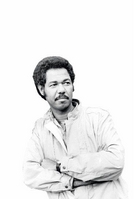STORY OF THE SONG: Boris Gardiner croons 'Every Nigger is a Star'
Published: Sunday | November 8, 2009

Gardiner
The 'n' word, the most stinging name that could be thrown at a black person, has had a curious relatively recent history, springing up in rap as an accepted reference for black performers and their 'homies'. Naturally, this was paralleled on the streets, with many a young black male referring to his close friends as "ma niggers".
A couple decades earlier, though, as Michael Manley surged to Jamaica House on a wave of black pride, and The Wailers broke new ground with Catch a Fire, Boris Gardiner was contracted to do the soundtrack of the movie Every Nigger is a Star. And, along with his brother, Barrington Gardiner, he wrote a song of the same name to head the soundtrack, which he created for the flick.
one of the best ever
Gardiner got involved in the project through Eddie Knight, owner of the Bronco Club in Union Square, Cross Roads, where he played with the Broncos band. It developed into The Boris Gardiner Happening, which had regular gigs at The Courtleigh Hotel, but when actor Colin Lockhart contacted Knight about the movie, Knight, in turn, got in touch with Gardiner.
"I had the experience so I took it," Gardiner said. "I had done the music for the pantomime Music Boy in 1969," he added, naming it as one of the best ever. "Oliver Samuels made his debut, Fae Ellington was the reader backstage. Miss Lou, Maas Ran, Buddy Pouyatt, all of the greats were in it," he said.
So "I took the contract, made the deal, sat down with my brother". And, having been given a sense of what was happening in the movie Every Nigger is a Star, they set about making the soundtrack.
The opening lines of the title song ("I'm not sure anymore just how it happened before/The places that I knew were sunny and blue"), Gardiner says, sees the person in the song in a reflective mood, looking back at generations past and events that had occurred. The 'sunny and blue' refers to Africa, then comes the fortitude and self-belief ("I can feel it deep inside, this black nigger's pride"), which are given voice:
"I have no fear when I say and I say it every day
Every nigger is a star."
The second verse speaks to loneliness and, eventually, a belief in a better place of acceptance and recognition:
"I have walked the streets alone
Twenty years I've been on my own
To be hated and despised
No one to sympathise
But there's one great thing I know
You can say I told you so
We've got a bright place in the sun
Where there's love for everyone
And every nigger is a star."
"It is not knocking anyone, but it is turning around the word 'nigger' to make it more positive," Gardiner said.
not deep in reggae
He did Every Nigger is a Star as a ballad and tells The Sunday Gleaner, "Maybe I was not deep in reggae at the time. And as a balladeer, I thought it would appeal more to the public. They would understand it more."
Gardiner does not know if Every Nigger is a Star was ever released as a single, as he had no control over the song, and comments: "In those days, we did not have our things together. And we got burnt. Ninety-nine per cent of us in the business lost a lot."
The movie lost a lot, too, as it did not turn out how it had been conceptualised. "They did not really have a strong movie. It came out like a documentary in the long run. Carib packed to capacity, waiting on something to happen. People were very disappointed. The movie flopped," Gardiner said.

















